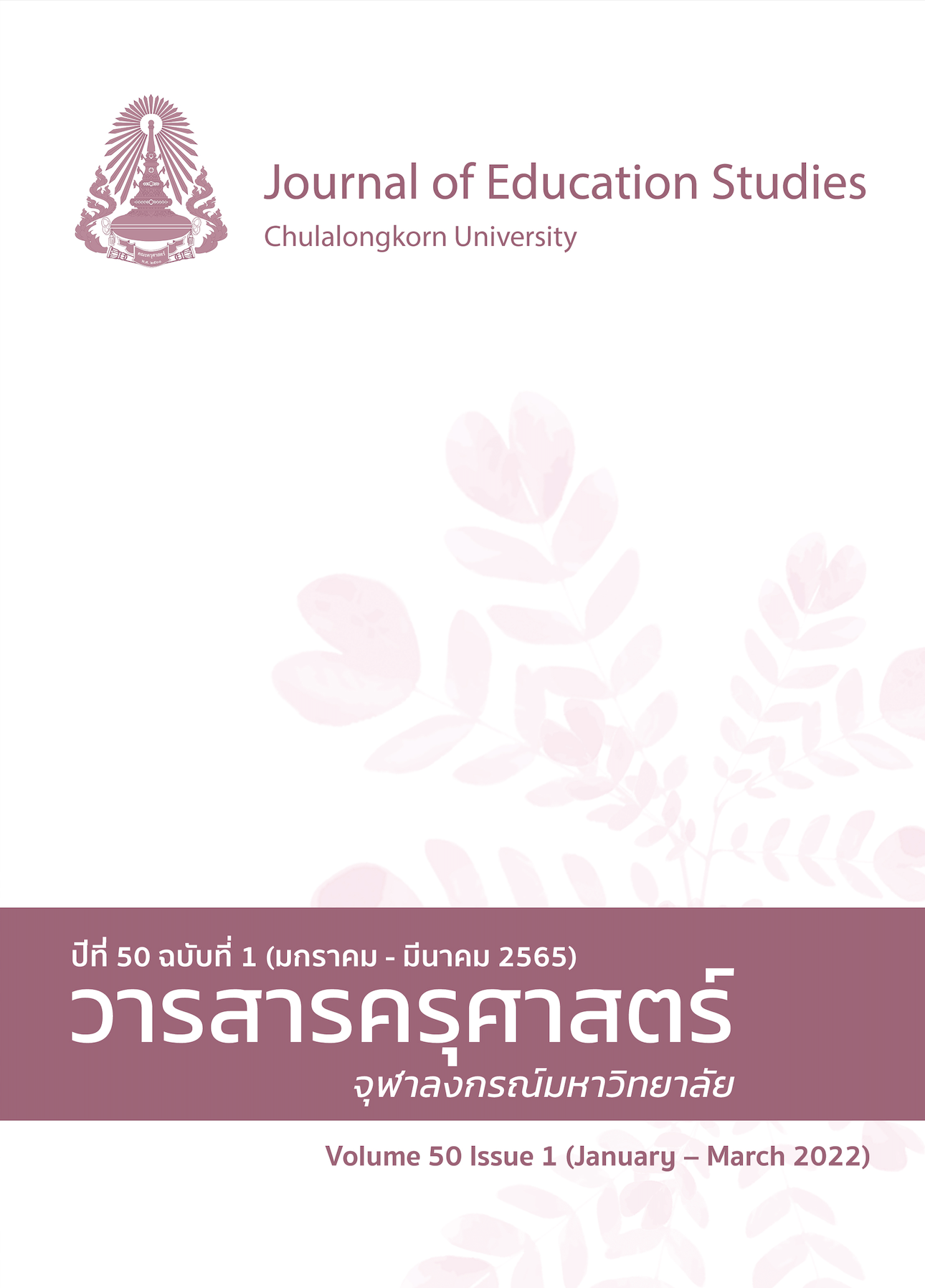The Development of Mathematics Learning Activities on the Topic of Fraction Problems Using the KWDL Technique of Mathayomsuksa 1 Students
DOI:
https://doi.org/10.14456/educu.2022.11Keywords:
development of mathematics learning activities, fraction problems, KWDL techniqueAbstract
This research aims to 1) development of mathematics learning activities on the topic of fraction problems using the KWDL technique of Mathayomsuksa 1 students to be efficient according to the 80/80 criteria, 2) compare the mathematics learning achievements on the topic of fraction problems using the KWDL technique of Mathayomsuksa 1 students before and after learning, and 3) study the satisfaction with the mathematics learning activities on the topic of fraction problems using the KWDL technique of Mathayomsuksa 1 students. Samples were 28 students of Mathayomsuksa 1/6 semester 1, academic year 2020, from the school under the Secondary Educational Service Area Office Bangkok. The simple random sampling technique was used to select the samples. The research instruments were mathematics learning achievement tests, and a students’ satisfaction survey. The statistics used for analysis were arithmetic mean (M), standard deviation (SD), and dependent t-test. The results showed that mathematics learning activities on the topic of fraction problems using the KWDL technique of Mathayomsuksa 1 students was efficient according to the 80/80 criteria. After learning, the average scores of mathematics learning achievement were significantly higher than before learning at .01. The overall satisfaction was at the highest level (M = 4.89).
References
ภาษาไทย
กระทรวงศึกษาธิการ. (2552). เอกสาร ประกอบหลักสูตรแกนกลางการศึกษาขั้นพื้นฐาน พุทธศักราช 2551 แนวปฏิบัติ
การวัดผลประเมินผลการเรียนรู้. โรงพิมพ์ชุมนุมสหกรณ์การเกษตรแห่งประเทศไทย.
กระทรวงศึกษาธิการ. (2560). ตัวชี้วัดและหลักสูตรแกนกลาง กลุ่มสาระการเรียนรู้คณิตศาสตร์ (ฉบับปรับปรุง พ.ศ.2560)
ตามหลักสูตรแกนกลางการศึกษาขั้นพื้นฐาน พุทธศักราช 2551. สํานักคณะกรรมการศึกษาขั้นพื้นฐาน กระทรวงศึกษาธิการ. โรงพิมพ์ชุมนุมสหกรณ์การเกษตรแห่งประเทศไทย.
กฤษฎา วรพิน. (2554). ผลของการจัดกิจกรรมการเรียนรู้คณิตศาสตร์โดยใช้เทคนิค เค ดับเบิ้ลยู ดีแอล และการใช้คำถาม
ระดับสูงที่มีต่อความสามารถในการแก้ปัญหา และความคงทนในการเรียนคณิตศาสตร์ของนักเรียนชั้นมัธยมศึกษา
ปีที่ 2 [วิทยานิพนธ์ปริญญามหาบัณฑิต, จุฬาลงกรณ์มหาวิทยาลัย]. Chulalongkorn University Intellectual
Repository (CUIR). http://cuir.car.chula.ac.th/handle/123456789/37028
จักรพงษ์ ผิวนวล. (2556). การศึกษาความสามารถในการเรียนคณิตศาสตร์ เรื่อง การแปรผัน โดยการจัดกิจกรรมการเรียนรู้
ด้วยเทคนิค KWDL ของนักเรียนชั้นมัธยมศึกษาปีที่ 3 โรงเรียนสาธิตแห่งมหาวิทยาลัยเกษตรศาสตร์ ศูนย์วิจัยและ
พัฒนาการศึกษา [วิทยานิพนธ์ปริญญามหาบัณฑิต, มหาวิทยาลัยเกษตรศาสตร์]. National Research Council of
Thailand (NRCT). https://doi.nrct.go.th/ListDoi/listDetail?ResolveDOI=10.14457/KU.the.2013.338
ชญาณิศา เป็งจันทร์. (2560). การจัดการเรียนรู้โดยใช้เทคนิค KWDL เพื่อพัฒนาผลสัมฤทธิ์ทางการเรียนคณิตศาสตร์ เรื่อง
โจทย์ปัญหา ของนักเรียนชั้นประถมศึกษาปีที่ 6. วารสารบัณฑิตวิจัย, 8(1), 71-82.
ชัยยงค์ พรหมวงศ์. (2556). การทดสอบประสิทธิภาพสื่อหรือชุดการสอน. วารสารศิลปากรศึกษาศาสตร์, 5(1), 7-20.
นรมน ดีหล้า. (2556). การพัฒนาแบบฝึกทักษะคณิตศาสตร์ด้วยเทคนิคการจัดการเรียนรู้ KWDL เรื่อง ลำดับอนันต์และ
อนุกรมอนันต์ สำหรับนักเรียนชั้นมัธยมศึกษาปีที่ 6 [วิทยานิพนธ์ปริญญามหาบัณฑิต ไม่ได้ตีพิมพ์]. มหาวิทยาลัยราชภัฏเชียงราย.
รัตนา ตั้งศิริชัยพงษ์. (2553). รูปแบบการสอนวิชาคณิตศาสตร์เพิ่มเติมที่ประยุกต์ใช้กลยุทธ์ การพัฒนาตนเองด้วยสัญญา
การเรียนในการพัฒนาสัมฤทธิ์ผลทางการเรียนคณิตศาสตร์ของนักเรียนด้วยผลสัมฤทธิ์ชั้นมัธยมศึกษาปีที่ 5 โรงเรียน
ท่าบ่อ จังหวัดหนองคาย. วารสารวิชาการ, 14(4), 23.
วรณัน ขุนศรี. (2546). ตัวอย่างการจัดการกิจกรรมการเรียนการสอนทนี่นำไปสู่การแก้ปัญหา. วารสารคณิตศาสตร์, 47(2), 9-12.
สถาบันส่งเสริมการสอนวิทยาศาสตร์และเทคโนโลยี. (2550). การวัดประเมินผลเพื่อคุณภาพ การเรียนรู้และตัวอย่างข้อสอบ
จากโครงการประเมินผลนักเรียนนานาชาติ (PISA). เซเว่นพริ้นติ้งกรุ๊ป.
สถาบันส่งเสริมการสอนวิทยาศาสตร์และเทคโนโลยี. (2551). ทักษะ/กระบวนการทางคณิตศาสตร์. ส เจริญการพิมพ์.
สถาบันส่งเสริมการสอนวิทยาศาสตร์และเทคโนโลยี. (2555). การวัดผลประเมินผลคณิตศาสตร์. ซีเอ็ดยูเคชัน.
สถาบันส่งเสริมการสอนวิทยาศาสตร์และเทคโนโลยี. (2561). หนังสือเรียนรายวิชาพื้นฐานคณิตศาสตร์ชั้นมัธยมศึกษาปีที่ 1
เล่ม 1 กลุ่มสาระการเรียนรู้คณิตศาสตร์ (ฉบับปรับปรุง พ.ศ. 2560) ตามหลักสูตรแกนกลางการศึกษาขั้นพื้นฐาน
พุทธศักราช 2551. สกสค. ลาดพร้าว.
สิริพร ทิพย์คง. (2545). หลักสูตรและการสอนคณิตศาสตร์. พัฒนาคุณภาพวิชาการ (พว).
อัมพร ม้าคนอง. (2557). คณิตศาสตร์สำหรับครูมัธยม. โรงพิมพ์แห่งจุฬาลงกรณ์มหาวิทยาลัย.
ภาษาอังกฤษ
Bruner, J. S. (1993). Explaining and interpreting: Two ways of using mind. In G. Harman (Ed.), Conceptions
of the human mind: Essays in honor of George A. Miller. Lawrence Erlbaum Associates.
Carr, E., & Ogle, D. (1987). K-W-L Plus: A strategy for comprehension and summarization. Journal of
Reading, 30(7), 626-631.
Maslow, A. (1970). Motivation and personality. Harper and Row.
OECD. (2019). PISA 2018 results what students know and can do. OECD Publishing. https://doi.org/10.1787
/5f07c754-en
Ogle, D. M. (1986). KWL a teaching model that develop active reading of expository text. The Reading
Teacher, 39(6), 564-570.
Skinner, B. F. (1953). Science and human behavior. The Free.
Wilson, J. W. (1971). Secondary school mathematics: Handbook on formative and summative
evaluation of student Learning. McGraw-Hall.
Downloads
Published
How to Cite
Issue
Section
License

This work is licensed under a Creative Commons Attribution-NonCommercial-NoDerivatives 4.0 International License.




